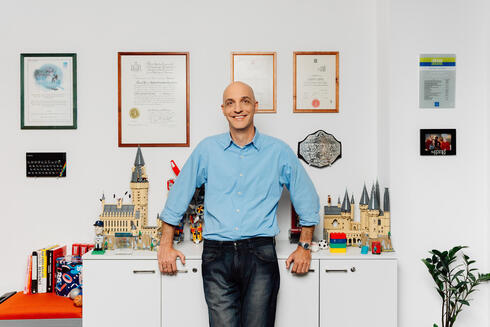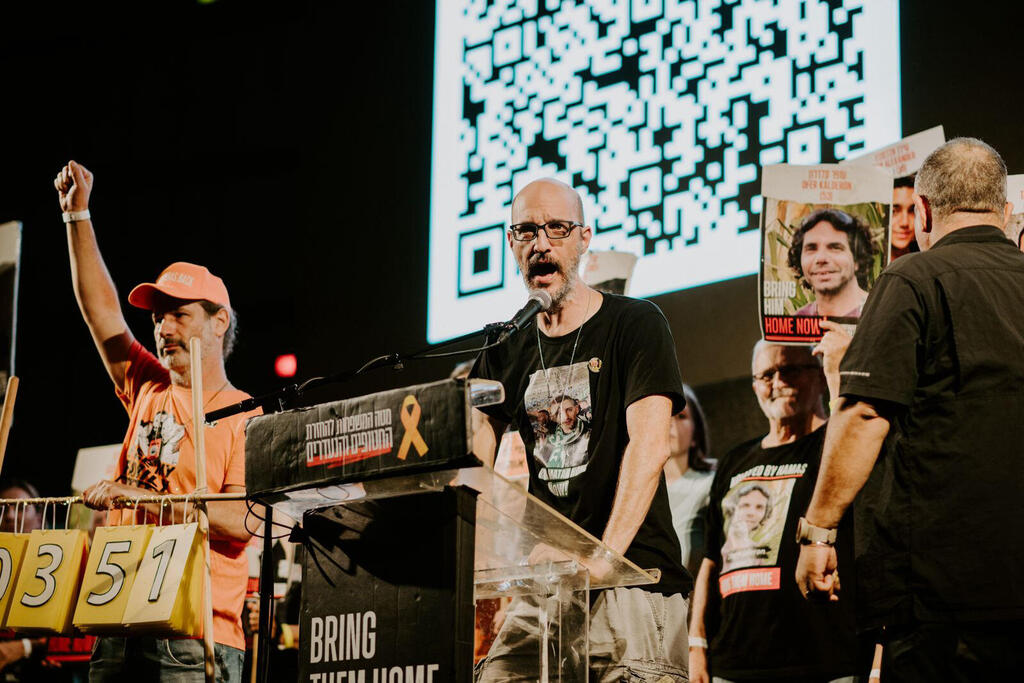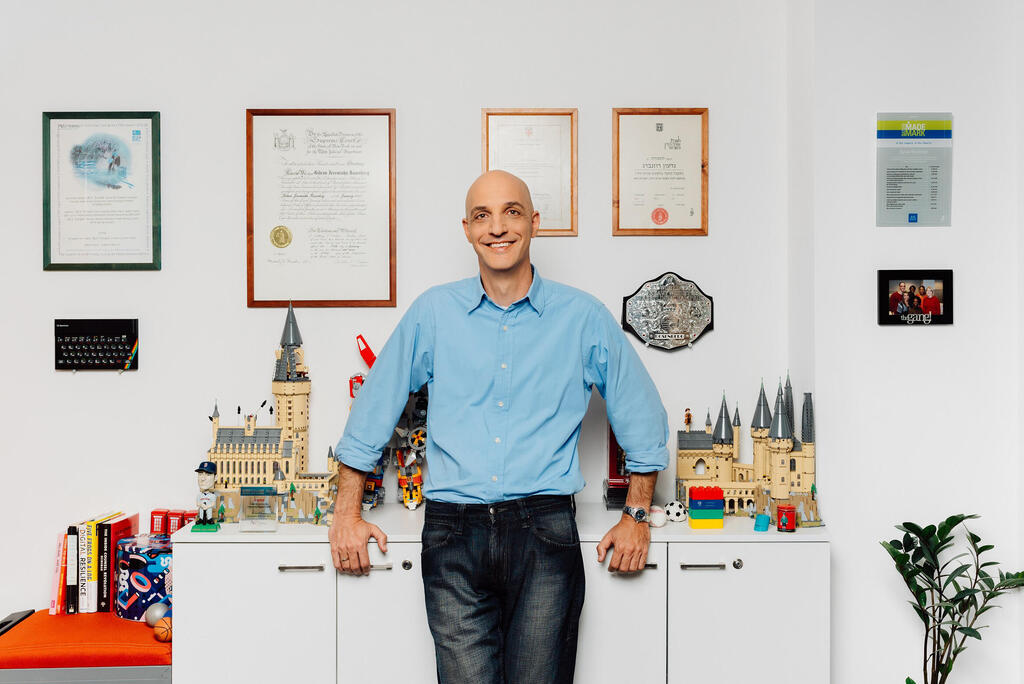
Inside Nvidia: Managing talent in a $3 trillion empire
Gideon Rosenberg, Head of HR Israel and Deputy General Counsel at Nvidia, discusses how employee well-being and innovation drive the company’s growth.
When the deal for the acquisition of Mellanox by the American chip giant Nvidia was being negotiated, Gideon Rosenberg, Head of HR Israel and Deputy General Counsel at Nvida, was a senior member of Mellanox’s legal department. He provided legal support throughout the process, and after the purchase and merger were completed in April 2020, he, like the other Mellanox employees, transitioned to become an Nvidia employee. Nvidia has since grown to become one of the largest employers in Israel's high-tech sector.
Mellanox, founded by Eyal Waldman, was sold for $6.9 billion, marking the second-largest exit in Israel's history and Nvidia's largest acquisition to date. Since then, Nvidia's market value has skyrocketed from $180 billion to nearly $3 trillion, making it the most valuable chip company globally and one of the five largest companies in the world. In Israel, Nvidia's workforce has almost doubled to over 4,000 employees, making its Israeli development center the second-largest outside the U.S.
It is estimated that, due to the surge in stock value, thousands of Nvidia’s 30,000 global employees—many of them in Israel—have become millionaires through their stock options. In early 2021, Rosenberg was appointed Head of HR at Nvidia Israel, alongside his role as Deputy General Counsel. Reflecting on his role, he shares, "In human resources, there are typically calm periods, times of hiring freezes or high recruitment phases. But this year, with the events of October 7th, life and work took on a whole new meaning. It was a real challenge for Human Resources, and I feel privileged to lead the team during such a crucial time."
Nvidia was founded in 1993 by Chris Malachowsky, Curtis Priem, and Jensen Huang, with the goal of developing graphics computing technology for the gaming market. The company was recognized as one of the best places to work in Israel, India, and the USA in 2023.
Gideon, Nvidia is now one of the leading companies globally, with hundreds of your employees reportedly becoming millionaires due to the stock’s rise. This has undoubtedly contributed to Nvidia's appeal as a workplace in Israel. How does this affect the management of human capital at the company?
"We've been recognized as a top workplace for years, so I always felt it was only a matter of time before this was reflected in surveys. While the recognition is exciting and flattering, it’s the outcome of continuous work, not a goal in itself. Our CEO, Jensen Huang, has a phrase I’ve adopted: 'Our job as managers is to make sure that every morning, our employees choose to come to work at Nvidia.' It’s a daily test, and we don’t take it for granted. We constantly invest in their well-being, creating a challenging work environment with cutting-edge technology, and ensuring that employees feel they are part of something significant. While money is important, people work for more than just financial rewards—they want to feel valued and enjoy their work."
Alongside Nvidia Israel’s high rankings as a workplace, there have been reports, such as a recent Bloomberg article, about intense pressure and excessive expectations on employees. How do you respond to these claims, and is Nvidia's corporate culture in Israel aligned with its global operations?
"There was that article, and sometimes things get blown out of proportion. That’s certainly not how we operate. Yes, there’s pressure—we have a lot of products to deliver, and the times are challenging. But we offer flexibility, including remote work and long weekends to help employees recharge. I won’t pretend it’s all roses, but those issues are marginal compared to the overall experience."
With the company’s success, employee retention must present a new challenge. How do you retain employees who have become millionaires?
"It’s all about the work. People stay because they’re passionate about the technology and being part of the next big thing. The fact that many are financially secure might actually help—they can focus more on the work itself. Our attrition rate is just 2.7% globally, compared to the industry average of 17%, and it’s even lower in Israel."
The number of employees leaving the company plummeted when it reached a trillion dollar value, just a year ago. The rate of departure a year before, in 2023, was almost double and stood at 5.3%.
Rosenberg, 47, lives in Tel Aviv with his wife Roni and their three children, aged 13, 11, and 7. He is a lawyer by training and has spent most of his career in in-house legal roles. Nvidia Israel operates centers in Yokneam, Tel Aviv, Be’er Sheva, and Ra’anana, although the Tel Hai center is currently closed due to the war in the north.
The war has posed significant challenges to Israel's high-tech sector. How has it affected Nvidia's operations, and how have you managed to maintain productivity?
"It hasn’t been easy. We haven’t missed any deadlines, but we’ve had to make adjustments. Hundreds of our employees, including reservists and their families, have been impacted. Supporting them has been our top priority. The global team in the U.S. has been fully supportive of our situation here."
The war also directly affected Nvidia, as one of its employees, Avinatan Or, was kidnapped to Gaza on October 7th. Rosenberg has been actively volunteering to support the families of abductees, starting with Or’s family and expanding to others.
2 View gallery


Gideon Rosenberg speaking at a protest calling for the release of the hostages from Gaza.
(Photo: Lior Rotshtein)
How do you deal with an employee being kidnapped, and how do you communicate this situation to Nvidia globally?
"There’s no playbook for this. We confirmed the kidnapping of Avinatan and his girlfriend, Noa Argamani, early on. Thankfully, Noa has since been rescued, but Avinatan is still in Gaza. We’ve been supporting his family from day one. We also have other employees whose family members were abducted. We try to help however we can."
With thousands of employees holding different political views, how do you maintain support for the abductees without bringing politics into the workplace?
"We don’t mix politics into the company, ever. Our focus is on supporting the families of our abducted employees. I use the analogy of recharging a phone battery—we support the families so they can keep fighting for their loved ones. That’s our responsibility as a company."
How has the war affected recruitment, and has it changed what candidates are looking for in an employer?
"People are now looking for stability. They want to be in a place where they know they will be taken care of, where they can feel secure. That’s the main shift we’ve seen since the war started."
Nvidia, originally established to develop graphics computing technologies, has since become a pioneer in artificial intelligence and supercomputing. It established its first development center in Israel in 2016, which has grown to include over 4,000 employees across multiple sites.
Nvidia is a global leader in artificial intelligence. How do you manage to attract talent in this field, and is there a risk to your Israeli center due to the war or concerns about Israel’s position in AI?
"I disagree with the idea that Israel isn’t a leader in AI. There are amazing talents here, and many of them are already working with us. The AI field is advancing globally, but there’s no shortage of talent in Israel. In fact, I see no danger to our center here. On the contrary, we've made massive investments, including Israel-1, the world’s most powerful AI computer. We continue to grow in Israel, and I see us only expanding further."














